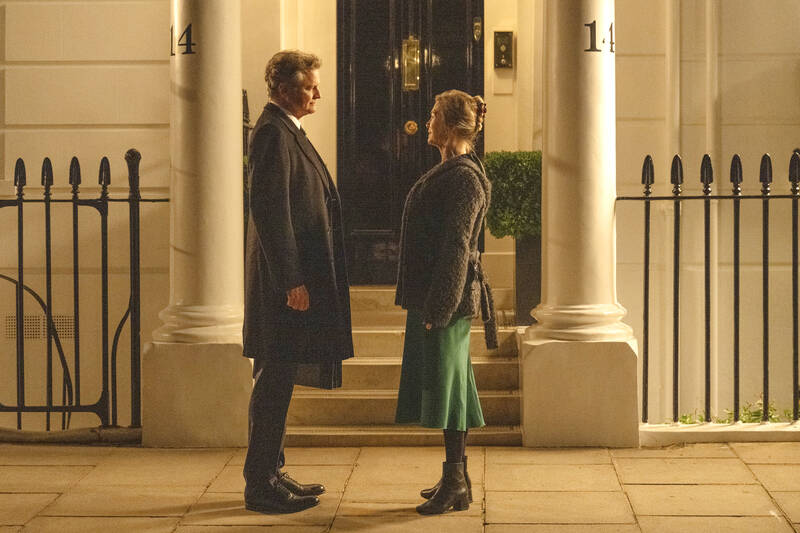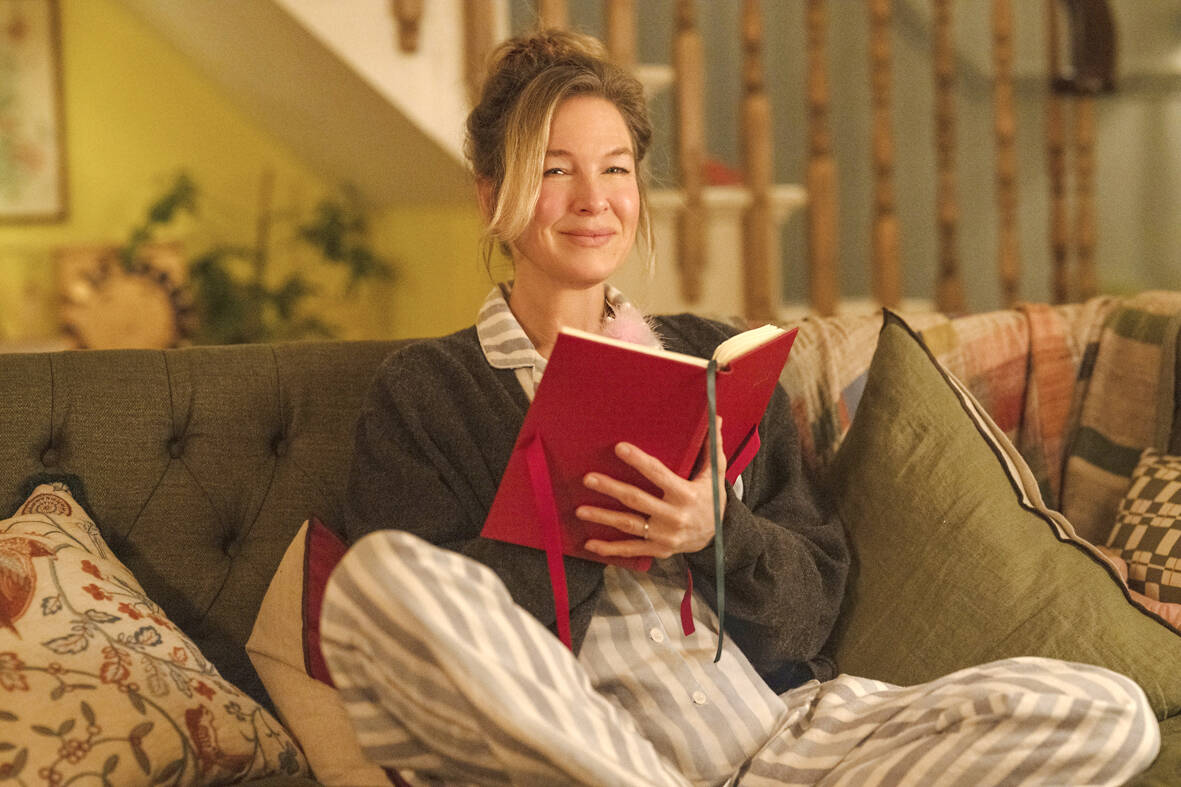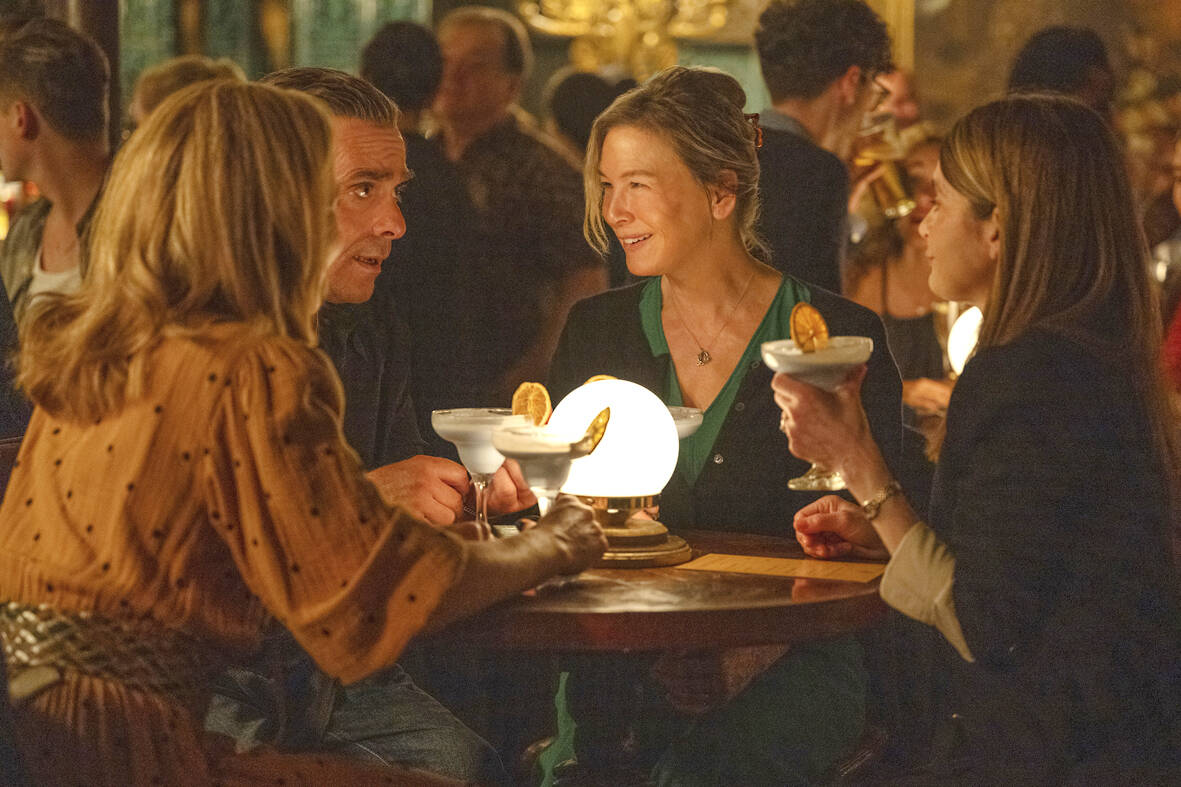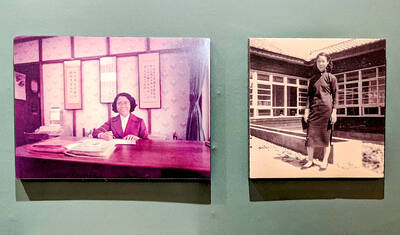It is a truth universally acknowledged, as Bridget Jones herself might write in her diary, that at the end of any Bridget Jones movie, our heroine has triumphed over all doubts and obstacles and is finally happy.
With a man. Well, so far, with one particular man: Mark Darcy, the stuffy-yet-dashing man of her dreams.
This, dear viewer, is not a spoiler for the new fourth movie, Bridget Jones: Mad About the Boy, which lands in Taiwan’s theaters today. In fact, if you’ve seen the trailer, you’ll know that Bridget (Renee Zellweger, still pretty delightful), who finally married Mark at the end of the third film, is now a widow.

Photo: AP
We’re not supposed to divulge exactly what happens next. But remember, folks, this is a classic romantic comedy franchise. Rom-coms can be sad and deep, but they still need to be romantic.
What makes Bridget Jones: Mad About the Boy especially enjoyable, then — and the best since the 2001 original — is not that Bridget finds a way yet again to triumph over doubts and obstacles. It’s that she still makes us care so darned much.
How does she do it after all these years? All I know is, I was rooting harder for her at the end of this film than I was with the others, even the original where she’s kissing Mark in the snowy street in underwear and sneakers.

Photo: AP
There are various possible explanations. One is Zellweger herself, who has brought her character gracefully into her 50s, retaining Bridget’s goofiness and deep-set optimism while reflecting hard-won life experience.
And there are subtle changes to the equation. The relationships in this latest film are more interesting — old ones and new.
Bridget’s relationship with herself is more interesting, too — and healthier. Sure, she can swig a full bottle of Chardonnay on a bad night. But the smoking is gone, and so, thank heavens, is the ridiculous weight obsession — a phenomenon that hit its nadir in the icky final line of the second film, with Bridget saying yes, you can find happiness, even if you “have a bottom the size of two bowling balls.”

Photo: AP
Nothing like that in this latest installment, directed by Michael Morris based on Helen Fielding’s novel (Fielding also co-wrote the script), which begins four years into Bridget’s widowhood. She’s living in a lovingly cluttered home in Hampstead with her kids, Billy and Mabel.
Bridget is getting dressed for a rare night at a dinner party, awaiting the sitter. That sitter is ... Daniel Cleaver himself, back for the fourth film after missing the third, which contained his funeral. (He wasn’t dead!) Hugh Grant is less adorable than in the beginning, more grizzled, still slightly creepy but more vulnerable — and a devoted friend.
At the party, all the couples want to know how Bridget is moving on with her life. She escapes, and at a bar later with her stalwart friend group (the gang from the previous movies), says she’s done with romance.
Of course, that will prove untrue. Bridget will meet her new love interest in the most Bridget Jones of ways: stuck awkwardly on a tree in the park, trying to rescue her children, also stuck.
To the rescue comes a dreamy park ranger (Leo Woodall), who also happens to see on Bridget’s phone that her friends have set up a Tinder account: “Tragic Widow Seeks Sexual Awakening.”
And thus, Bridget’s new love interest is 29-year-old Roxster McDuff — a ridiculous name, rivaling how ridiculously sexy he is. The two embark on a steamy courtship.
At the same time, Bridget has returned to work as a TV producer. Her colleagues salivate at the sight of Roxster, especially when he shows up to a party, rips off his shirt and dives into a pool to rescue a dog.
“Now THAT’S a rebrand,” Bridget’s friend says approvingly of her new life. But can their relationship triumph over the considerable age gap? It’s a subject — older woman, younger man — that’s a hot topic in current movies.
Also raised here is the question of how one moves on from deep grief to live fully again – a goal that Bridget’s late father had urged upon her (Jim Broadbent reappears briefly, as does Gemma Jones as Bridget’s mother. Colin Firth appears in a few dreamy moments. )
And there are plenty of other new issues for Bridget to navigate, too, such as how hard it is to keep up with other parents at school. For example: When Bridget is asked, by her son’s handsome and interesting yet seemingly guarded science teacher Mr. Wallaker (Chiwetel Ejiofor), to speak to the class about her career, he tells her the previous parent to come in was a Nobel winner in nuclear physics.
No worries. The lessons of this last — or so they say — Bridget Jones chapter speak to how one adjusts expectations and finds the right way to live in the world.
And on that note, as old photos from 25 years of Bridget’s life fly by during closing credits, it’s hard not to feel like she’s family — and to be more than a little proud of how she found her way.

Following the shock complete failure of all the recall votes against Chinese Nationalist Party (KMT) lawmakers on July 26, pan-blue supporters and the Chinese Communist Party (CCP) were giddy with victory. A notable exception was KMT Chairman Eric Chu (朱立倫), who knew better. At a press conference on July 29, he bowed deeply in gratitude to the voters and said the recalls were “not about which party won or lost, but were a great victory for the Taiwanese voters.” The entire recall process was a disaster for both the KMT and the Democratic Progressive Party (DPP). The only bright spot for

Water management is one of the most powerful forces shaping modern Taiwan’s landscapes and politics. Many of Taiwan’s township and county boundaries are defined by watersheds. The current course of the mighty Jhuoshuei River (濁水溪) was largely established by Japanese embankment building during the 1918-1923 period. Taoyuan is dotted with ponds constructed by settlers from China during the Qing period. Countless local civic actions have been driven by opposition to water projects. Last week something like 2,600mm of rain fell on southern Taiwan in seven days, peaking at over 2,800mm in Duona (多納) in Kaohsiung’s Maolin District (茂林), according to

Aug. 11 to Aug. 17 Those who never heard of architect Hsiu Tse-lan (修澤蘭) must have seen her work — on the reverse of the NT$100 bill is the Yangmingshan Zhongshan Hall (陽明山中山樓). Then-president Chiang Kai-shek (蔣介石) reportedly hand-picked her for the job and gave her just 13 months to complete it in time for the centennial of Republic of China founder Sun Yat-sen’s birth on Nov. 12, 1966. Another landmark project is Garden City (花園新城) in New Taipei City’s Sindian District (新店) — Taiwan’s first mountainside planned community, which Hsiu initiated in 1968. She was involved in every stage, from selecting

As last month dawned, the Democratic Progressive Party (DPP) was in a good position. The recall campaigns had strong momentum, polling showed many Chinese Nationalist Party (KMT) lawmakers at risk of recall and even the KMT was bracing for losing seats while facing a tsunami of voter fraud investigations. Polling pointed to some of the recalls being a lock for victory. Though in most districts the majority was against recalling their lawmaker, among voters “definitely” planning to vote, there were double-digit margins in favor of recall in at least five districts, with three districts near or above 20 percent in